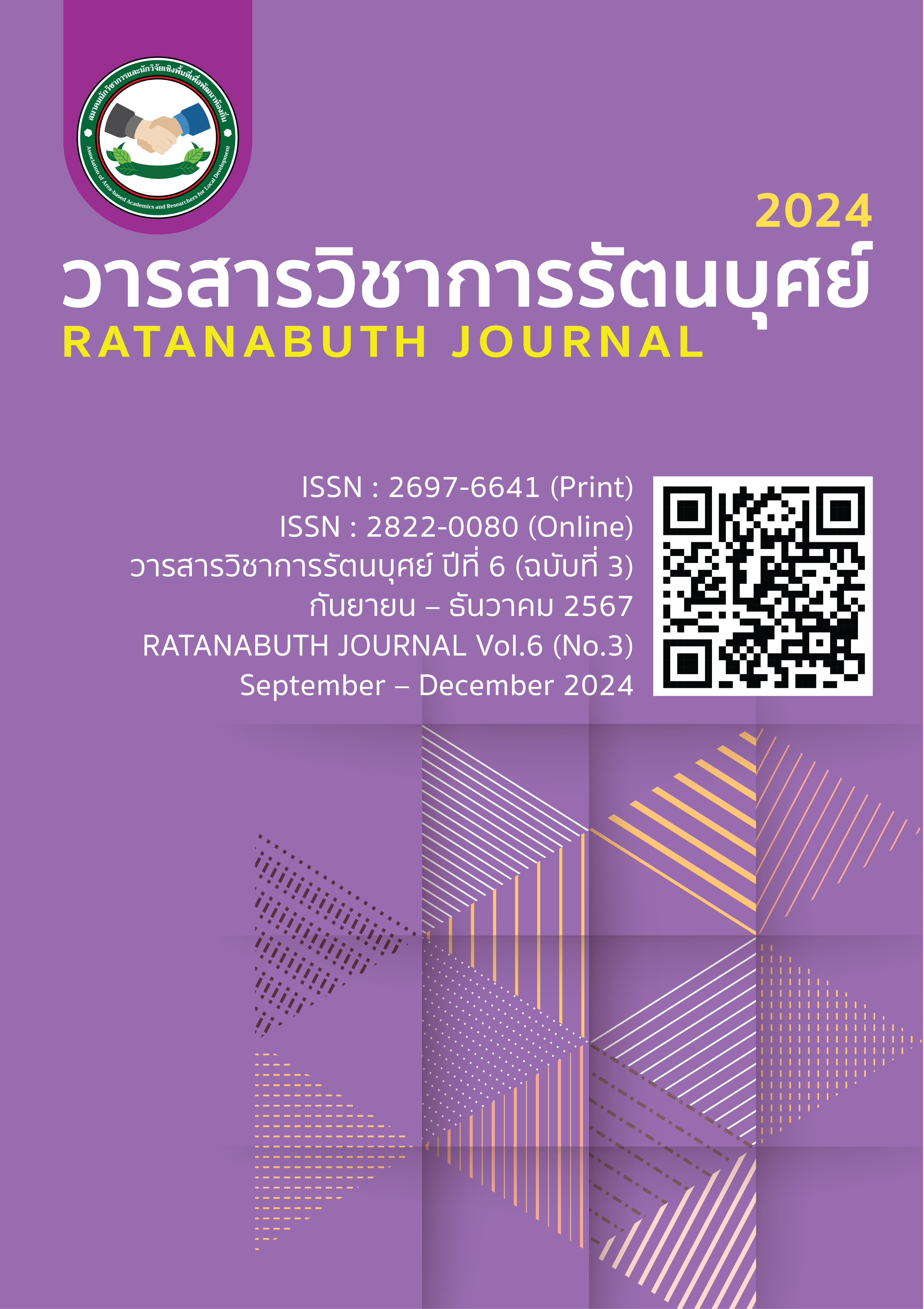Assessing the Mediation Mechanism of Job Satisfaction, Job Attractiveness and Job Effort on Innovative Work Behavior: The Perspective of Psychological Capital Assessing the Mediation Mechanism of Job Satisfaction, Job Attractiveness and Job Effort on Innovative Work Behavior: The Perspective of Psychological Capital
Main Article Content
Abstract
This study aims to 1) study the level of Psychological Capital, Job Satisfaction, Job Attractiveness, Job Effort and Innovative Work Behavior 2) Study the influence of Psychological Capital effect to Innovative Work Behavior Through Job Satisfaction, Job Attractiveness and Job Effort. by using quantitative research methods, with a questionnaire as an online data collection tool for 459 copy by the sample group used in this research included people working in information technology and research and development departments. The research results found that the level of opinions of all variables was at a high level. The results of the structural equation testing had a consistency detection index value that passed the criteria. It has a direct and positive influence on the job satisfaction, job interest, job effort and innovative work behavior of the personnel. With the mediating variables of job satisfaction, job interest, and job effort, the structural equation could explain the variances of job satisfaction , innovative work behavior, job interest, and job effort at 90.4, 84.7, 75.2, and 60.9 percent, respectively.
Article Details

This work is licensed under a Creative Commons Attribution-NonCommercial-NoDerivatives 4.0 International License.
References
จารุวรรณ ยอดระฆัง, ศรัณย์ พิมพ์ทอง และคณะ (2564). ประสิทธิผลของโปรแกรมพัฒนาพฤติกรรมสร้างนวัตกรรมในงานของบุคลากรผู้มีศักยภาพสูงบนฐาน แนวคิดทุนทางจิตวิทยาเชิงบวก. ประเทศไทย: มหาวิทยาลัยศรีนครินทรวิโรฒ.
ธมยันตี ประยูรพันธ์. (2561). การทดสอบโมเดลสมการโครงสร้างความพึงพอใจในการปฏิบัติงาน พฤติกรรมการเป็นสมาชิกที่ดีขององค์กร และพฤติกรรมการทําางานเชิงนวัตกรรมของพนักงานองค์กรวิสาหกิจ ขนาดกลางและขนาดย่อมในจังหวัดชายแดนใต้. วารสารมหาวิทยาลัยนราธิวาสราชนครินทร์ สาขามนุษยศาสตร์และสังคมศาสตร์, 5 (2), 55 - 73.
บวรรัตน์ ธนาฤทธิวราภัค. (2561). ปัจจัยความน่าดึงดูดของนายจ้างที่มีอิทธิพลต่อความตั้งใจสมัครงาน ของกลุ่มคนเจเนอเรชั่น แซด ที่กาลังศึกษาอยู่ในระดับปริญญาตรี. ประเทศไทย: มหาวิทยาลัยธรรมศาสตร์.
ปัญญ์กณิฐ เนรมิตตกพงศ์, อริสา สำรอง, และคณะ (2563). ความสัมพันธ์ระหว่างทุนทางจิตวิทยาเชิงบวก บรรยากาศองค์การ ที่ส่งผลต่อพฤติกรรมสร้างนวัตกรรมในการทำงานของบุคลากร ฝ่ายปฏิบัติการขนส่งทรัพย์สินธุรกิจธนาคาร. Dhonburi Rajabhat University Journal, 14 (2), 141 - 155.
ภัทราภรณ์ ผ่องแผ้ว และชนิดา จิตตรุทธะ. (2566). ความสัมพันธ์ระหว่างทุนทางจิตวิทยาเชิงบวกและพฤติกรรมสร้างสรรค์นวัตกรรมของข้าราชการศูนย์รักษาความปลิดภัย กองบัญชาการกองทัพไทย. วารสารสมาคมนักวิจัย, 28 (1), 54 - 71.
มินตรา อุทัยรังษี, บุญพิชชา จิตต์ภักดี และคณะ (2562). ทุนทางจิตวิทยาและความผูกพันในงานของพยาบาล โรงพยาบาลศูนย์. พยาบาลสาร, 47 (4), 314 - 324.
อัจฉรียา พัฒนสระคู. (2567). วัฒนธรรมองค์กรและความพึงพอใจในงานที่ส่งผลต่อความผูกพันต่อองค์กรของพนักงาน ภาคธุรกิจในพื้นที่กรุงเทพมหานคร. วารสารวิทยาการจัดการวิชาการ มหาวิทยาลัยราชภัฏเพชรบูรณ์, 6 (10), 34 - 45.
Chad H. Van Iddekinge, John D. Arnold, Herman Aguinis, Jonas W. B. Lang and Filip Lievens. (2023). Work Effort: A Conceptual and Meta-Analytic Review. Journal of Management, 49 (1), 125 - 157.
De Jong, J., & Den Hartog, D. (2010). Measuring innovative work behaviour. Creativity and innovation management, 19(1), 23-36.
Dinh Tho, N., Dong Phong, N., & Ha Minh Quan, T. (2014). Marketers' psychological capital and performance: the mediating role of quality of work life, job effort and job attractiveness. Asia-Pacific journal of business administration, 6(1), 36-48.
Djourova, N., Rodriguez, I., & Lorente-Prieto, L. (2019). Validation of a modified version of the Psychological Capital Questionnaire (PCQ12) in Spain. Revista Interamericana de Psicología Ocupacional, 37(2), 93-106.
Henderson R. (1993). Underinvestment and incompetence as responses to radical innovation: evidence from the photolithographic alignment equipment industry. RAND Journal of Economics, 24(2): 248–270.
Highhouse, S., Lievens, F., & Sinar, E. F. (2003). Measuring attraction to organizations. Educational and Psychological Measurement, 63 (6), 986 - 1001.
Jin-Feng Uen, Rama Krishna Kishore Vandavasi, Kun Lee, Prasanthi Yepuru and Vipin Saini. (2021). Job crafting and psychological capital: a multi-level study of their effects on innovative work behaviour. Team Performance Management: An International Journal, 27 (1), 145 - 158.
Judge, T. A., and Klinger, R. (2008). Job satisfaction. In Michael Eid, and Randy J. Larsen. (Eds.), The Science of Subjective Well-Being. The Guilford press: London.
Leiponen A, Helfat CE. (2010). Innovation objectives, knowledge sources, and the benefits of breadth. Strategic Management Journal, 31(2), 224–236.
Luthans, F. and Carolyn, M. & Youssef-Morgan. (2017). Psychological Capital: An Evidence-Based Positive Approach. The Annual Review of Organizational Psychology and Organizational Behavior, 339 - 366.
Luthans, F., Avolio, B. J., Avey, J. B., & Norman, S. M. (2007). Positive psychological capital: Measurement and relationship with performance and satisfaction. Personnel psychology, 60 (3), 541 - 572.
Luthans, F., Norman, S. M., Avolio, B. J., & Avey, J. B. (2005). The mediating role of psychological capital in the supportive organizational climate-employee performance relationship. Journal of Organizational Behavior. The International Journal of Industrial, Occupational and Organizational Psychology and Behavior, 29 (2), 219 - 238.
Michael Mustafa, Alan Coetzer, Hazel Melanie Ramos and Jorg Fuhrer. (2021). Exploring the effects of small- and medium-sized enterprise employees’ job satisfaction on their innovative work behaviours: the moderating effects of personality. Journal of Organizational Effectiveness: People and Performance, 8, 228 - 250.
Minh Ha Nguyen, Nguyen Vinh Luan and Bui Thanh Khoa. (2021). Employer Attractiveness and Employee Performance: An Exploratory Study. Journal of System and Management Sciences, 11, 97 - 123.
Mostafa, B. A. (2022). Leveraging workforce insights to enhance employer attractiveness for young job seekers during pandemic era. CellPress, 1-13.
Nguon, V. (2022). Effect of transformational leadership on job satisfaction, innovative behavior, and work performance: A conceptual review. International Journal of Business and Management, 17 (12), 75 - 89.
Smith, S. W., & Shah, S. K. (2013). Do innovative users generate more useful insights? An analysis of corporate venture capital investments in the medical device industry. Strategic Entrepreneurship Journal, 7(2), 151-167.
Yanto Tjoa and Muhtosim Arief. (2022). Determinants Of Innovative Work Behavior: The Role Of Job Satisfaction As Mediation And Environmental Dynamism As Moderating Variable. Proceedings of the 5th European International Conference on Industrial Engineering and Operations Management (pp. 2263 - 2275). Rome, Italy: IEOM Society International.


